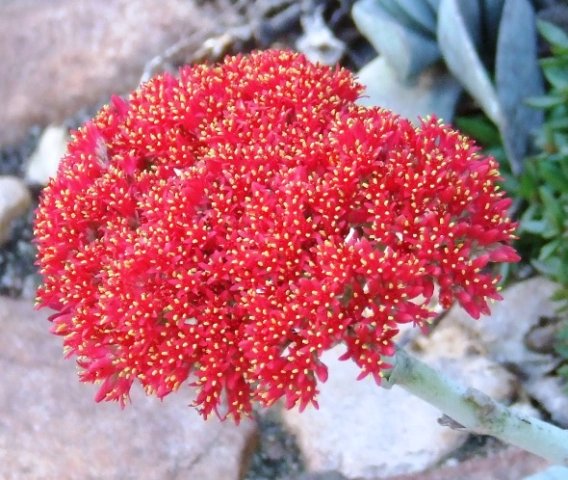Crassula perfoliata

Author: Ivan Lätti
Photographer: Lorraine Vermeulen
Crassula perfoliata comprises four recognized local varieties, var. falcata, a fifth, no longer considered indigenous in South Africa. There are only two red flowering options to choose from for this distinctly grey-leaved garden plant. Var. minor is a small (smaller than this one?) plant with grey-green (greener?) leaves and var. coccinea mostly with yellow-green ones; neither quite providing a fit. Maybe this is a horticulturally developed cultivar and not a natural species.
The species is found in the east of South Africa, from the Eastern Cape through KwaZulu-Natal, Mpumalanga and Limpopo, as well as further to the north in some neighbouring countries.
The habitat is variable shrubland and thicket. none of the varieties is considered threatened in habitat early in the twenty first century.
C. perfoliata is but one of thousands of plants that have complex recorded histories in botanical literature, reflecting both knowledge growth and judgment calls regarding taxonomic decisions. Bypassing the debate may be settled via a homemade common name, and maybe a bewildering proliferation of such names. Or one may enjoy another nameless plant by its looks alone. To some the scientific names are simply too daunting, particularly the frustrating changes occurring in the often long names.
Gardeners don't change their names (too often). Their pet plants shouldn't either! Unfortunately there is elusive stuff going on to do with the characteristics of and relations among the plants of ones interest. Dipping into that knowledge and absorbing select bits add to enjoyment of the plants encountered in everyday life. And for that one needs names! Just as some people do not start conversations with strangers and thaw only after introductions or serendipitous opportunities, plants sometimes become better appreciated when their names are known. Getting into nature, or just a little closer, is an appealing consideration.
Relating to nature, its animals, plants and other wonders, may either be routine relaxation habit lacking significance, or a deeply personal experience sought and enjoyed repeatedly. Lifelong behaviour patterns become key ingredients of experience.
Quiet reflection and observation accompany mental activity and a private range of feelings, animalistic enjoyment or therapeutic soothing. Maybe even an innocent addiction. Stress will reduce, coping with everything life enhanced, insights and life-sustaining communion with nature may beckon.
For others the bush sets the mind racing, the curiosity heightened. Intellectual pursuits may match escapes into learning about birding, the ocean, mountains, forests or deserts. Ecology teaches relationships among more or less everything, conservation offers outlets for growing citizenship values, escapism transports far away from taxing job and everyday obligations (Euston-Brown and Kruger, 2023; Smith, et al, 2017; iNaturalist; http://redlist.sanbi.org).

